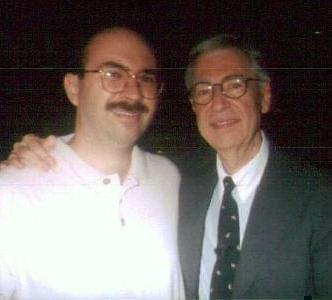Beautiful Days

The day that I met Fred Rogers. David Thiel
I’m reminded that it was ten years ago today that Fred Rogers left us. Here’s the tribute that I wrote that morning, which was subsequently picked up by the public broadcasting news outlet Current as well as several PBS station program guides.
Mister Rogers was one of the first programs that I can remember watching. I was, of course, part of the show’s target demographic back then. I can’t recall much from my preschool years, but I do know that I loved the trolley, I loved the neighborhood and I loved Fred Rogers.
Like many early loves, it faded with age and distance. I moved on to programs intended for older kids: flashier, action-oriented, violent in the ways that caregivers and watchdogs lament and children adore. For the most part, I forgot about Fred and his neighborhood, reminded only on occasion by the parodies that proliferated in the ’80s as yesterday’s innocents grew into sarcasm and despair.
Let’s face it, it was easy to mock Fred Rogers. He had a simple style and a cadence that invited imitation. He stubbornly retained old-fashioned production values in an era of hydraulic-powered Muppets and computer-generated dinosaurs. Further-more, one could assign all sorts of hidden motivations to his soft-spoken manner and his devotion to children. Comedians, fools and cynics wondered aloud whether a beast lurked within such a seemingly humble man of God.
Mister Rogers re-entered my life once I began my career in public television. I worked as a master control operator for WYIN in Merrillville, Ind., in the late ’80s. One day, working the afternoon shift, all heck broke loose: The transmitter was down, the chief engineer and the program director were shouting and frantically hitting buttons. I was still very new, and very nervous about keeping my first broadcasting job. As my anxiety mounted, I focused on the eye of the storm, the oasis of calm, the 17-inch screen in front of me: the one on which Fred Rogers offered words of quiet reassurance. It was a moment I hope I’ll never forget.
Over the years, I became fascinated with the program, deconstructing its messages and marveling at the bizarre flights of fantasy that often emerged from the Neighborhood of Make-Believe. Mister Rogers had a way of tying together everything, making connections that defied adult logic. A segment on silverware inspired an opera about a trip to Spoon Mountain. In Fred’s world, your friend might be a Purple Panda from Planet Purple, and your king might sing “Row, Row Your Boat” in the most complicated manner possible.
Several years ago, Mister Rogers made the keynote address at the PBS Annual Meeting in Miami. As always, he spoke of simple, but important ideas: acts of caring, the need to love and the need to be loved. When the speech and the conference concluded, many ran to catch their planes and to return to their worlds of adult responsibilities. But a great many lined up for the opportunity to spend a few moments with the kind old man who had greeted them each morning so many years ago. Grown men and women were moved to tears as they hugged their childhood friend.
For his part, Fred waited patiently, shaking hands, posing for photos, signing conference program books and giving each person all the time they needed to express their feelings. He stayed for at least an hour, long enough for me to get through the line, then to run to my hotel room and fetch my wife so that she could hug and cry as well.
People have subsequently asked me, “Is he really the way he acts on TV?” My response has always been, “He’s exactly what you see on TV.”
That’s what I remember most about Fred Rogers. He was a man who could temporarily wipe away years of bitterness with a few words reminding us that We Are Special, each in our own way. Fred would probably reject this notion, but I feel that he was perhaps the most special of all of us. The world needs more people like Mister Rogers. There can never be enough love, acceptance and affirmation.
